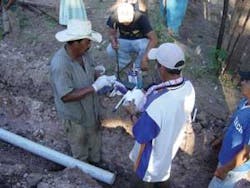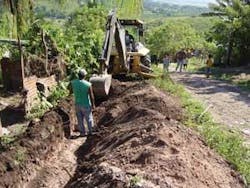By David R. Muñ oz, Ph.D.
Plastic Pipe & Fitting Association, Colorado School of Mines engineering students members come to aid of village of displaced Hurricane Mitch refugees.
A Honduras pipe installation crew receives guidance from PPFA member consultants.
During the spring of 2006, the Plastic Pipe & Fitting Association (PPFA) agreed to encourage its members to provide in-kind support for a water project in Colinas de Suiza, Honduras. This provided the catalyst for additional supporters to leverage funding to make this project a reality.
Hurricane Survivors
The village Colinas de Suiza is in the Municipality of Villanueva, which is about 20 km south of San Pedro Sula, Honduras. The village is a 100+ acre tract of land opened by the Honduran federal government to accommodate refugees displaced from lower lying areas after hurricane Mitch devastated the country in 1998. With a population of over 8,000 (~1,300 families), it and has capacity for up to 10,000 people. The villagers earn an average income of $6-8/day while working in nearby sugarcane fields or in clothing, materials or food factories.
Field Trip
Colorado School of Mines (CSM) students and faculty first became involved in the project when we traveled to survey the village to determine the most important needs of the people. This trip resulted to an international proposal for a multi-phased approach, which won UNESCO’s 2005 Mondialogo Engineering Award. The plan became one of working toward providing water for each family, but also considering the full cycle of water and studying the Honduran experience (and associated cost) with centralized waste treatment systems. Among other things, use of eco-toilets became an important consideration.
Additional trips with students occurred in Fall 2005 and 2006 to map the village with GPS and also map subsurface electrical resistivity of the aquifer because the municipal water & sanitation department indicated an interest in drilling a 120m deep well for this application. Two existing wells (at 80m depth) within the same field service nearby villages. We certainly didn’t want to negatively affect these existing wells’ performance. With the additional mapping data, we were able to create a piping configuration and a solid estimate of the quantity and sizes of pipes and fittings needed.
A backhoe clears away dirt prior to the plastic pipe installation.
This led to a conversation with David Chasis, a CSM alumnus and a PPFA member, who became interested in the project and convinced the group’s membership to contribute in kind or with other donations. Participating in the donation were: Georg Fischer Sloane, Hayward Industrial Products, IPEX Inc., IPS Corp., JM Eagle Manufacturing Co., LASCO Fittings Inc., Mueller Industries Inc., NIBCO Inc., Shintech Inc., and Silver-Line Plastics Corp.
Project Scope
The original village infrastructure included 1,750 lot boundaries (~10m x 18m) and graded gravel and dirt roads. Electricity distribution was added to the village in 2005. Water, though, was found to be the most important missing basic need. To survive, the people collected rain water from the roofs during the rainy season and use it primarily to wash clothing. They also purchase water delivered by truck at a cost of $1.50 per barrel. Each family of six uses about two barrels of water a day. Sanitation consists of pit latrines, with one on each lot.
Why
The project goal is first to reduce the cost of living (allowing villagers to meet their family’s basic needs) and improve the health for the people of Colinas de Suiza. They currently spend a third to half of their income for water. This cost can be significantly reduced by providing water pumped from a nearby aquifer to a large storage tank and distribute it by gravity to each lot. Another goal is to enhance the educational experience for CSM students participating in a new minor program called Humanitarian Engineering – which involves projects that require engineering skills as well as enhanced awareness of culture and societal differences to sustainably improve lives of the underserved throughout the world.
How
After it became clear the PPFA was going to support the project, the Municipality of Villanueva agreed to also contribute the well, pump and labor for installation. Other essential collaborators include Food for the Poor (FFTP), a Coconut Creek, Florida, USA-based Catholic relief organization which focuses on projects to improve lives of the poor living in Latin America and agreed to transport plastic pipe and fittings from the United States to Honduras as well as cover the $15,000 anticipated additional expenses. Operation Compassion, another non-governmental organization (NGO) that operates a warehouse in Cleveland, Tennessee, USA, offered to store the pipe and fittings and load them into four shipping containers.
The people of Colinas de Suiza are of course also an integral part of this project. We believe it’s important for them to share in the expense of this project. Thus, we’ve encouraged them to provide funds to install a 250,000 gallon storage tank at the highest elevation in the village.
Sustainability
Sustainable community development is a major long-term goal of this project. This implies an importance on its social and environmental as well as economic and engineering aspects. With a project of this magnitude, it’s anticipated the change in the lives of the people will be significant. Though the potential for positive change is significant, there’ll be a need to maintain the water system and to consider wastewater issues.
To ensure a sense of ownership for all constituents, we believe all interested parties must be economically involved in the capital investment. In addition, the people are being asked to contribute to the labor for the project by filling in the ditches dug by machines in front of their homes and also digging the ditches to each of their homes. It’s vital for the villagers to feel they’re part of a community that shares in constructing and maintaining this system. Success will help build the trust and community confidence necessary to work together on other important projects in the future. It’s also important for the local water & sanitation department to be directly involved as is the case here.
Hands-on training was provided to the workers and students as they began working together to lay the first of the pipe in the village. The piping configuration provided by the student designers also left ample opportunities for the village leaders and water department workers to contribute to decisions on exact pipe locations and flow control solutions. This acceptance of local indigenous knowledge also enhances the project ownership, allowing all parties to learn from each other.
The continual level of commitment of the people of Colinas de Suiza and the officials of the Municipality of Villanueva bodes well for system sustainability and effective and continuous community development.
A Learning Environment
This has been an excellent learning experience for all involved. Twenty-three CSM engineering students have so far been a part of this Colinas de Suiza project. In addition, 20 engineering students from private university Universidad Tecnológica Centoamericana (UNITEC) and five students from Universidad Autonoma de Honduras-Valle Sula (a public university) have been involved. It represents the first time we’ve done a project of this magnitude with an international team of students – something we plan to continue.
Lastly, the current student design team is actively working with five volunteer families to develop eco-toilets that will become integrated into their gardens. The plan is that this appropriate technology will yield a healthy and aesthetic result that’s eventually shared with neighbors and, in time, utilized throughout the village. In this way, we’re considering the entire water cycle in a sustainable way.
Author’s Note:
David R. Munoz, Ph.D., is an associate professor in the Engineering Division at the Colorado School of Mines in Golden, Colorado, USA. Contact: [email protected]




